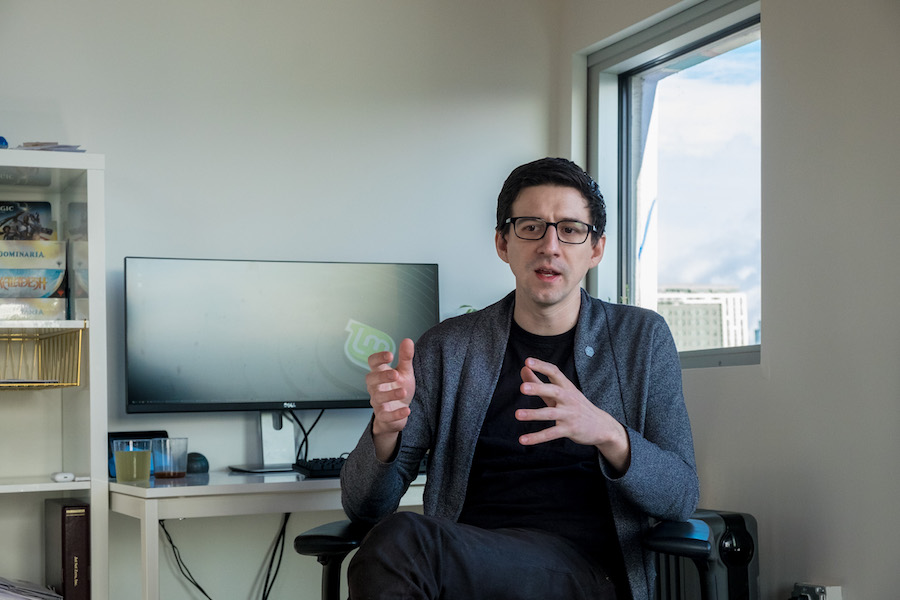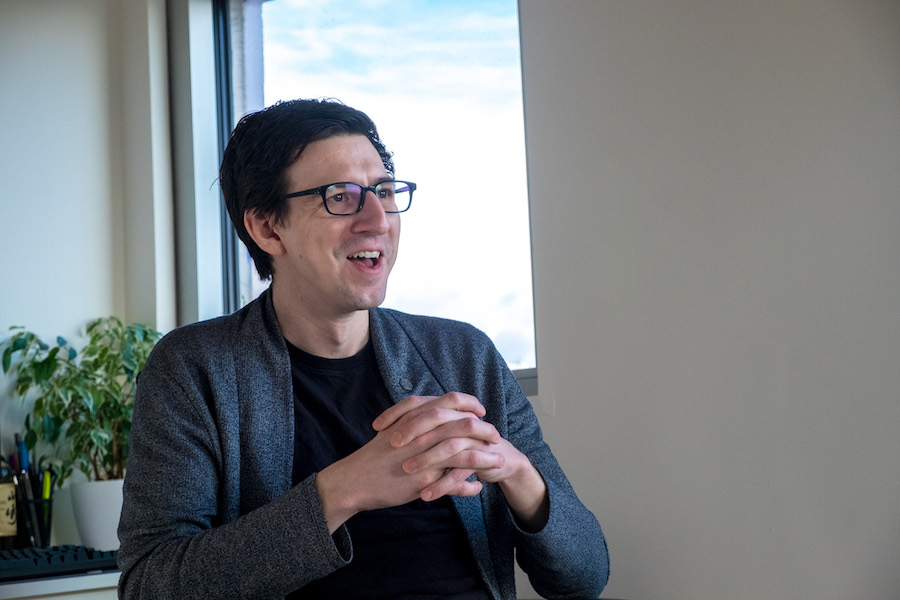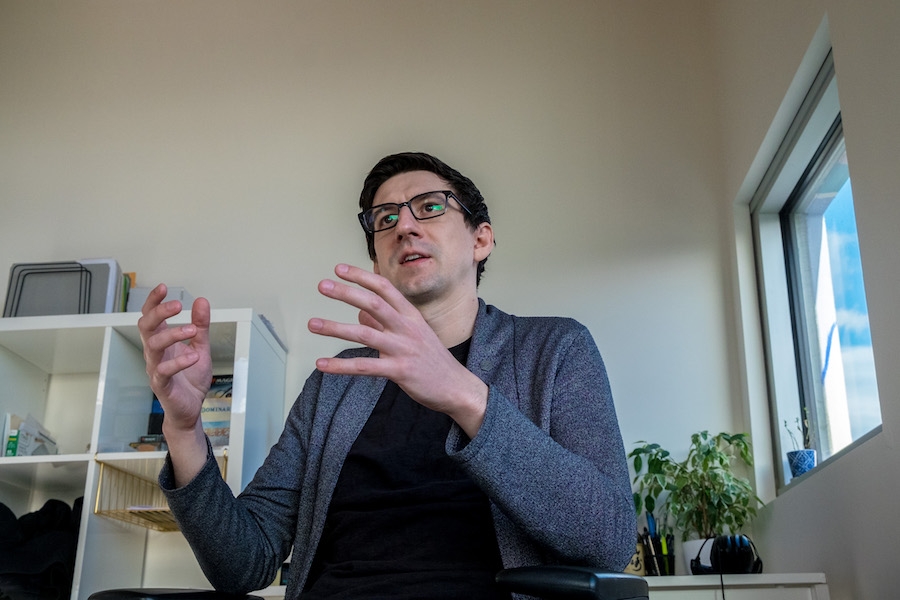Smith + Crown CEO Brian Lio on the growth of a blockchain cluster in Portland.
Walking into blockchain research firm Smith + Crown’s Portland office is like entering a division of the Central Intelligence Agency. The door to the airy Central Eastside headquarters is unmarked to stave off unwanted inquiries. Globetrotting researchers solicit information from crypto-anarchists (people seeking political freedom through cryptographic software) in Berlin and financiers in Hong Kong.
Smith + Crown seeks to fill an information void surrounding a technology it believes could upend the economy and governance models. More practically, it researches and produces reports on how blockchain technology can improve efficiency for lawyers, insurers, recruiters and just about everyone else. The twenty-person team is expanding quickly, with a Hong Kong office set to open in three months and a new intelligence platform under development.
With a corner office featuring wonky accoutrements, such as a 20-sided die and boxes of Magic cards, CEO Brian Lio fits the image of a tech executive. Yet the 34-year-old took an atypical path toward the blockchain industry, first founding a reality TV travel show, then design firm The Bright Iron Group. He is constantly learning, a mindset that serves him well in a space where, as he puts it, the only certainty is uncertainty. We spoke to Lio about promising applications for blockchain, the growth of Smith + Crown and the development of a blockchain hub in Portland.
Responses have been edited for brevity and clarity.

Why did you see a need for Smith + Crown?
When bitcoin came out everyone was ecstatic that we “figured it out” — that we solved money; that the banks were no more. We [the Smith + Crown team] kept coming back to the idea that this thing before us was infinitely complex. From there we decided that information, intelligence, analysis would be the most important thing.
We’re very mission driven. Everyone here believes in the fundamental transformative power of blockchain technology and crypto-economic systems. It’s our goal to develop the world’s best information and distribute it as widely as possible.
Tell us about your intelligence-gathering process. What are you learning from the crypto-anarchists in Berlin that help you build the new economy built on blockchain?
As sci-fi as the blockchain industry is, the state of information is actually relatively poor. We don’t have well-developed research, news and information sources. We’re developing an intelligence platform to help. If you really want to know what’s going on in Europe or Asia, you have to go meet people on the ground and win trust. We spent five years, one person at a time, building a global network we can source information from.
Everyone we talk to is excited about different aspects of blockchain. These technologies are just tools and you can use them for so many different things. A lot of it has to do with truly decentralized systems, and really difficult questions about systems where everything is on-chain (i.e. transactions that are recorded on the blockchain), about changing our systems of governance. These are fundamental, almost philosophical, questions.

So how is your new intelligence platform going to work?
It’s a web-based interface into our entire analyst team. We have gone through and more or less tracked every [cryptocurrency] asset that’s ever been issued. We have a team that’s exceptionally good at understanding them. We can provide a concise understanding of how these work.
There are a huge number of players looking to get into the crypto industry, but they’re missing a set of sophisticated tools to interact with. Our goal is to provide that base level of intelligence to help people find organizations that are doing thoughtful work.
What are a few of the most promising applications of blockchain for professional services—legal, insurance and human resources?
One of the principal components you look at in crypto-economic systems is smart contracts. You can write a set of code that immediately controls capital based on a set of rules. This is fascinating in the realm of law. We can build really simple contracts that disseminate your funds in a sort of will scenario, where you want funds allocated if you stop checking in on the contract, all the way to highly complex financial contracts that have different parties validating different parts.
For insurance, there’s this idea of a prediction marketplace. Anyone can create one for an event—who’s going to win an election or the outcome of a sporting event? Or how much rain falls in a certain zip code in Idaho? The idea that you can make a market and bet on anything allows for interesting results. It allows you to verify real-world events in the blockchain world. With a robust system of prediction markets you can do really interesting things with insurance. For example, you can create spot (i.e. very specific) insurance markets. We’re still a ways off from that, but there are a lot of promising frameworks being explored.
Related Story: Blockchain Venture Studio to open in Portland
Attracting a qualified workforce is difficult in any corner of the tech industry. How do you train people to work with blockchain, a space defined by uncertainty?
Training is one of the toughest parts of this. No matter how brilliant someone is or what their background is, there are a lot of gaps. Every day that you wake up in this industry something else has happened. It’s very daunting and humbling. The people who are successful are passionate about learning. There really are no experts in this space. We study this all day, every day and there’s still so much we’re pushing to understand.
Blockchain solves some security problems, but also gives rise to new risks. What should cybersecurity professionals be on the lookout for as the technology becomes more common?
The biggest concern we see is the idea of custody. You have your tokens or assets and whatever value they represent. You’re responsible for the private keys—letters or numbers that control that.
We’re seeing a lot of development in custody solutions and safeguards. Typing the wrong letters and numbers into a terminal resulting in the loss of your funds is not a comforting experience. People want a user interface; they want a password reset button. Right now we see everyone from hedge funds to early movers having an advantage because they’re willing to take on more risk.
Privacy has become a key concern for Facebook and other tech companies. Does the distributed nature of blockchain—in which your information is stored on thousands of computers—give rise to consumer privacy concerns?
Privacy is very much the topic of the day. In the early days of bitcoin there was this thought that it’s anonymous digital cash. The truth is you can see every transaction associated with every account. It ended up being a great tool for law enforcement, and now there’s this whole subgroup of companies that do on-chain forensics and analysis.
Of all the networks out there, many have different approaches to security and privacy. How you integrate that privacy into your systems, how you deal with the regulatory concerns around that—these are all emerging questions.
What’s the potential for a blockchain industry cluster to take shape in Portland?
I think there’s a pretty good shot at it. If you look at blockchain in the U.S. nowadays, there’s not really an ecosystem yet. The diversity of individuals and endeavors in the space is wild. We go all around the world talking about virtually anything imaginable. In the U.S., there’s an enormous amount of capital and innovation, but it hasn’t quite found that hub. We’ve primarily seen movement in Denver and Portland.
Overall the U.S. has some significant challenges when it comes to clarifying regulatory policy and ensuring there’s a way for small companies to innovate. But at the end of the day we’re really encouraged. We haven’t seen anything else like the [Oregon Blockchain] Venture Studio. That’s why we signed on as a research partner. We’ll be excited to see the first half of 2019. Now that there’s a visible hub for this, how do we create a community that can support further development?
To subscribe to Oregon Business, click here.








